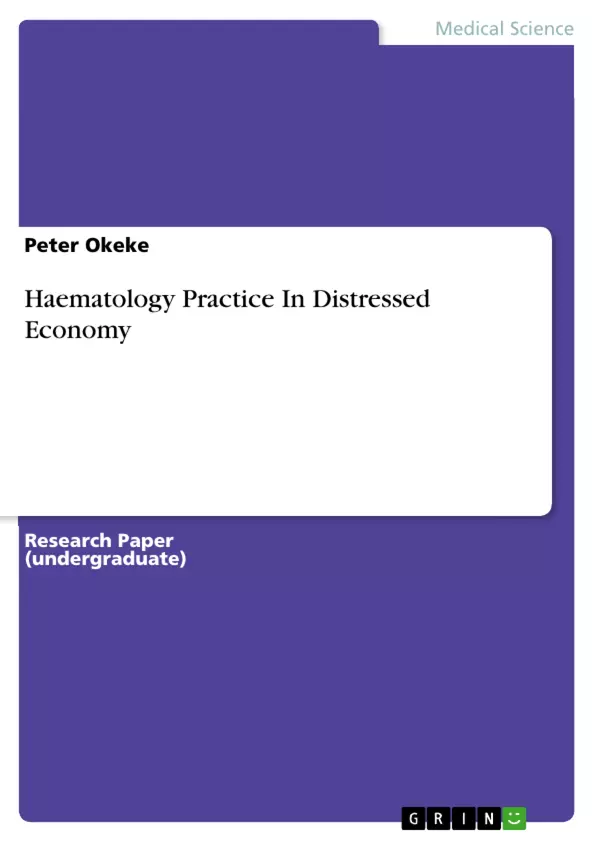In most countries, there are likely to be some laboratories with limited resources, but in economic distressed countries, there are few laboratories with highly trained technologists and sophisticated equipment. In these countries therefore, i t is not unusual for laboratory tests to be carried out by nurses and ordelies in outpatient consulting rooms, corridors and in rural health centres.
Understaffing,poor morale, inadequate equipment and erratic supplies of reagents are chronic problems in laboratories in poorer countries and these factors have a major impact on the range and quality of services that can be offered. Many smaller laboratories are multifunctional, performing Haematology, Parasitology, Clinical chemistry and Bacteriology tests. A blood transfusion service is usually available at the larger institutions and unless there is a national blood service, laboratory staff will be responsible for donor selection, blood collection and issuing of blood. If there is no organisation of public health laboratories, routine laboratories will be required to provide high quality health surveillance data for epidemiological and public health monitoring.
In a number of economically distressed countries, the difficulties are compounded by the fact that health services are becoming overwhelmed by expanding epidemics of HIV/AIDS(Human immunodeficiency vírus/Acquired immune deficiency syndrome), tuberculosis and malária. Diagnosis and monitoring of these diseases require a healthy,robust and reliable laboratory service. Thus malária diagnosis must be confirmed by a laboratory test because other disorders can masquerade clinically as malária. The diagnosis of tuberculosis may require boné marrow aspiration and culture and trephine biospy examination, especially in patients who are also HIV positive because in these cases sputum tests for acid fast organisms are frequently negative. Monitoring of HIV progression to AIDS and effectiveness of antiretroviral therapy requires Haemoglobin estimation, CD4-poistive lymphocyte counts and plasma viral load estimation.
The main purpose of this topic-(Haematology practice in distressed economy) is to point towards an effective haematology service that can be provided despite serious limitations.
Inhaltsverzeichnis (Table of Contents)
- Chapter -1
- Introduction
- Types of laboratories
- Chapter-2
- ORGANIZATION OF CLINICAL LABORATORY SERVICE
- AVAILABILITY OF TESTS AT EACH LEVEL
- MICROSCOPES
Zielsetzung und Themenschwerpunkte (Objectives and Key Themes)
The main objective of this work is to explore how to provide effective hematology services in countries with limited resources. This includes identifying the necessary facilities and planning a referral network for cases requiring advanced investigations. The work emphasizes the importance of collaboration between local and international institutions to adapt standard protocols and improve local supportive care.
- Hematology practice in distressed economies
- Challenges of providing hematology services in developing countries
- Organization of clinical laboratory services at different levels
- Availability of hematology tests in different settings
- Importance of microscopes in hematology diagnosis
Zusammenfassung der Kapitel (Chapter Summaries)
Chapter 1 introduces the challenges faced by hematology laboratories in economically distressed countries, highlighting the impact of limited resources on the quality and range of services offered. It discusses the common issues of understaffing, inadequate equipment, and erratic reagent supplies, particularly in the context of expanding epidemics like HIV/AIDS, tuberculosis, and malaria.
Chapter 2 examines the organization of clinical laboratory services in such settings, classifying them into three levels based on size, staffing, and workload. It describes the specific tests available at each level and the equipment required, emphasizing the critical role of microscopes in diagnosis.
Schlüsselwörter (Keywords)
This work focuses on hematology practice in distressed economies, emphasizing the challenges of providing quality services with limited resources. Key topics include laboratory organization, availability of tests, equipment requirements, and the crucial role of microscopes in diagnosis. Other key themes include understaffing, inadequate equipment, erratic reagent supplies, and the impact of expanding epidemics such as HIV/AIDS, tuberculosis, and malaria.
Frequently Asked Questions
What are the main challenges for hematology in distressed economies?
Key challenges include understaffing, poor morale, inadequate equipment, and erratic supplies of reagents for laboratory tests.
How is a clinical laboratory service organized in resource-limited settings?
Laboratories are typically organized into three levels based on size and staffing, ranging from small rural centers to larger national institutions.
Why is the microscope so critical in these settings?
In many poorer countries, sophisticated equipment is unavailable, making the microscope the primary tool for diagnosing diseases like malaria and tuberculosis.
How do HIV/AIDS and Malaria impact laboratory services?
These epidemics overwhelm health services, requiring robust testing for diagnosis (e.g., CD4 counts, viral load) which is difficult to maintain with limited resources.
What is the purpose of a blood transfusion service in these labs?
In the absence of a national service, laboratory staff are responsible for donor selection, blood collection, and cross-matching.
- Quote paper
- Peter Okeke (Author), 2010, Haematology Practice In Distressed Economy, Munich, GRIN Verlag, https://www.grin.com/document/163508



